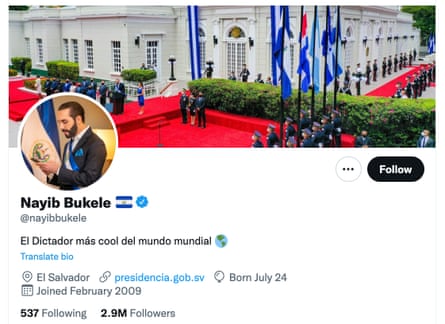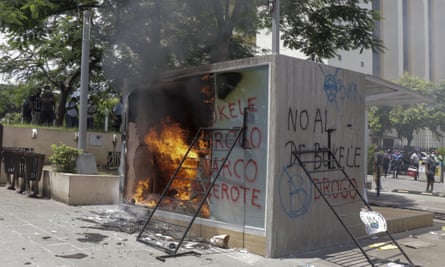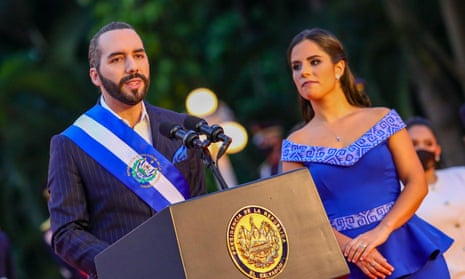The top US diplomat in El Salvador has warned of “a decline in democracy” in the country, whose president, Nayib Bukele, recently changed his Twitter profile to read “the coolest dictator in the world”.
Speaking after the state department put five Salvadoran supreme court justices on a list of “undemocratic and corrupt actors”, the US embassy chargé d’affaires in San Salvador said the action was taken because the justices voted to allow the president’s re-election, “which is clearly not allowed under the constitution”.
“What are we seeing now? It is a decline in democracy, and that is exactly what is happening,” said Jean Manes.
Bukele said the decision to put the Salvadoran justices on the list “has nothing to do with corruption”. He called it “pure politics and the lowest form of interventionism”.
“We are nobody’s back yard,” Bukele wrote in his Twitter account. Over the weekend he changed his Twitter profile to “dictator”, in an apparently ironic reference to protests against him. By Tuesday he had changed it again to “the coolest dictator in the world”.

Bukele’s New Ideas party won a congressional majority this year and quickly replaced the five members of the constitutional chamber of the supreme court and the independent attorney general who had balked at several of Bukele’s earlier actions.
Soon after, the constitutional chamber threw out what had long been interpreted as a constitutional ban on consecutive presidential re-election, setting the stage for Bukele to potentially seek a second term in 2024. Bukele has not so far announced plans to seek reelection.
Bukele is a prolific Twitter user, and frequently posts memes promoting bitcoin, which was adopted as legal tender earlier this month.
Last week, thousands of people gathered in El Salvador’s capital for the first mass demonstration against Bukele and his bitcoin policy.

Bukele dismissed the march, saying protesters “took to the streets to fight a dictatorship that doesn’t exist”.
The populist president has maintained support by promising to stamp out corruption, which was rampant among the country’s traditional parties.

Lawyer Eduardo Escobar of Citizen’s Action, a civic group devoted to government accountability, said Bukele’s Twitter profile description “is part of the president’s strategy”, noting: “He is trying to ridicule the feelings of the public or the opposition.”
